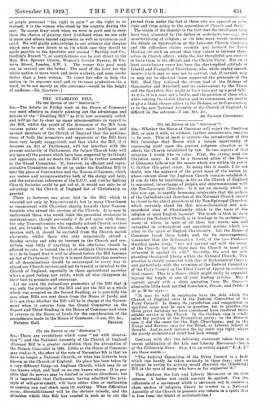THE ENABLING BILL.
(To THE EDITOR OF THE " SPECTATOR.") SIR,—The debate on Friday week in the House of Commons was most effective in clearly pointing out the advantages and defects of the "Enabling Bill" as it is now commonly called, and will go far to clear up many misconceptions in regard to the Bill, whilst the result of the discussion of the Bill from various points of view will convince most intelligent and earnest members of the Church of England that the anticipa- tions of both the promoters and opponents of the Bill have been very largely exaggerated, and that whilst the Bill, if it becomes an Act of Parliament, will not interfere with the present authority of Parliament, the future Church body will not have all the powers which have been suggested by its friends and opponents, and no doubt the Bill will be further amended in the Grand Committee. If, however, an efficient and repre- sentative Committee can be set up under the Enabling Bill to take the place of Convocation and the Houses of Laymen, which are useless and unrepresentative both of the clergy and laity, and the pernicious influences of the E.C.U. and similar fighting Church Societies could be got rid of, it would not only be of advantage to the Church of England but of Christianity in general.
There is, however, one great blot in the Bill which is resented not only by Nonconformists but by many Churchmen as inconsistent with Christian charity towards those Noncon- formists who attend the services of the Church. It is easy to understand those who would limit the parochial electorate to communicants, though personally I do not agree with them; but why Nonconformists who regularly attend Church services and are friendly to the Church, though not in entire com- munion with it, should be excluded from the Church parish electorate, whilst those who only occasionally attend a Sunday service and take no interest in the Church and con- tribute very little if anything to the offertories should be allowed to vote, is beyond the wit of ordinary Churchmen, and it is to be hoped that it will be altered before the Bill becomes an Act of Parliament. Surely it is most desirable that members of all denominations should be encouraged in every way to attend our Church services and not be treated as inimical to the Church of England, especially in those agricultural parishes where a good feeling now exists, which all wise clergymen do their best to promote and encourage.
Let me warn the out-and-out promoters of the Bill that it was only the principle of the Bill and not the Bill as a whole which was accepted on the Second Reading, as is generally the case when Bills are sent down from the House of Lords, and it is not clear whether the Bill will be in charge of the Govern- ment when it returns from the Grand Committee on the Report and Third Reading in the House of Commons and when it returns to the House of Lords for the consideration of the amendments made in the House of Commons.—I am, Sir, Sic.,






































 Previous page
Previous page